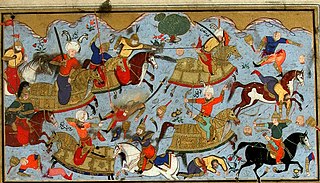Related Research Articles
Halil İnalcık was a Turkish historian. His highly influential research centered on social and economic approaches to the Ottoman Empire. His academic career started at Ankara University, where he completed his PhD and worked between 1940 and 1972. Between 1972 and 1986 he taught Ottoman history at the University of Chicago. From 1994 on he taught at Bilkent University, where he founded the history department. He was a founding member of Eurasian Academy.

Ahmet Şimşirgil is a Turkish historian.

Below is the identified timeline of the History of the Turkic peoples between the 6th and 14th centuries.

The Treaty of Constantinople, also known as the Peace of Istanbul or the Treaty of Ferhad Pasha, was a treaty between the Ottoman Empire and the Safavid Empire ending the Ottoman–Safavid War of 1578–1590. It was signed on 21 March 1590 in Constantinople. The war started when the Ottomans, then ruled by Murad III, invaded the Safavid possessions in Georgia, during a period of Safavid weakness. With the empire beleaguered on numerous fronts and its domestic control plagued by civil wars and court intrigues, the new Safavid king Abbas I, who had been placed on the throne in 1588, opted for unconditional peace, which led to the treaty. The treaty put an end to 12 years of hostilities between the two arch rivals. While both the war and the treaty were a success for the Ottomans, and severely disadvantageous for the Safavids, the new status quo proved to be short lived, as in the next bout of hostilities, several years later, all Safavid losses were recovered.
The Ottoman–Persian Wars or Ottoman–Iranian Wars were a series of wars between Ottoman Empire and the Safavid, Afsharid, Zand, and Qajar dynasties of Iran (Persia) through the 16th–19th centuries. The Ottomans consolidated their control of what is today Turkey in the 15th century, and gradually came into conflict with the emerging neighboring Iranian state, led by Ismail I of the Safavid dynasty. The two states were arch rivals, and were also divided by religious grounds, the Ottomans being staunchly Sunni and the Safavids being Shia. A series of military conflicts ensued for centuries during which the two empires competed for control over eastern Anatolia, the Caucasus, and Iraq.
The timeline of the Seljuk Sultanate of Rum (1077–1307) is summarized below.
The Truce of Constantinople was signed on 22 July 1533 in Constantinople by the Ottoman Empire and the Archduchy of Austria.
Treaty of Constantinople was a treaty between Ottoman Empire and Afsharid Persia signed on 24 September 1736, ending the Afsharid–Ottoman War (1730–35).
Treaty of Aynalıkavak was a treaty between Ottoman Empire and Russian Empire signed on March 10, 1779. The formal name is Aynalıkavak bond of arbitration. Aynalıkavak is a palace in İstanbul where the treaty was signed.

The Battle of Çıldır was fought in 1578 during the Ottoman–Safavid War (1578–1590).

Silahdar Damat Ali Pasha, also called Silahdar Ali Pasha, was an Ottoman general and Grand Vizier. His epithet silahdar means arms bearer and damat means bridegroom, because he married Fatma Sultan.

Baltacı Mehmet Pasha was an Ottoman statesman who served as grand vizier of the Ottoman Empire, first from 1704 to 1706 and again in 1710 to 1711, and as Kapudan Pasha in 1704.
Kemankeş Kara Mustafa Pasha was an Ottoman Albanian military officer and statesman. He served as Kapudan Pasha and as grand vizier.

Süleyman Çelebi was an Ottoman prince and a co-ruler of the Ottoman Empire for several years during the Ottoman Interregnum. There is a tradition of western origin, according to which Suleiman the Magnificent was "Suleiman II", but that tradition has been based on an erroneous assumption that Süleyman Çelebi was to be recognised as a legitimate sultan.

İsa Çelebi was an Ottoman prince and a co-ruler of the empire during the Ottoman Interregnum.

Hekimoğlu Ali Pasha was an Ottoman statesman and military leader who served as Grand Vizier of the Ottoman Empire three times.
Rami Mehmed Pasha (1645–1706) was an Ottoman statesman and poet who served as Grand Vizier (1703) and governor of Cyprus and of Egypt (1704–06). He was known as a poet of divan literature.
References
- ↑ Nicolae Jorga: Geschichte des osmanischen Reiches, trans. by Nilüfer Epçeli, Yeditepe Yayınları, İstanbul, 2009, ISBN 975-6480-17-3
- ↑ Prof.Dr.Yaşar Yücel-Prof.Dr.Ali Sevim: Türkiye Tarihi II, AKDTYK yayınları,İstanbul, 1990
- ↑ Usually considered that the present day Iran-Iraq border had been established by this treaty